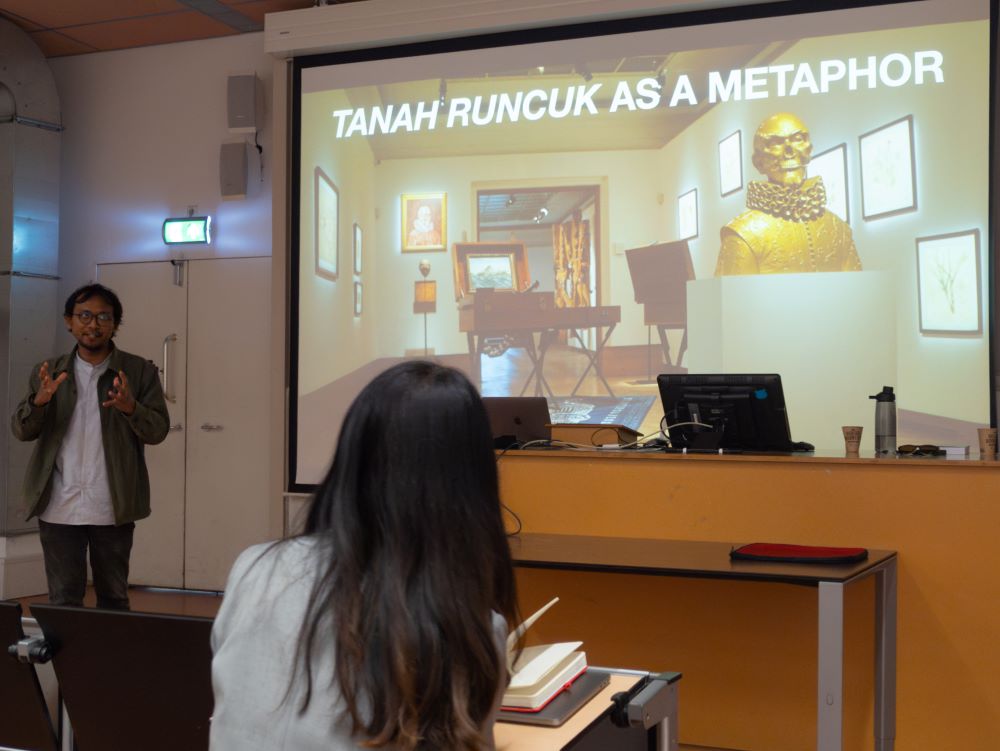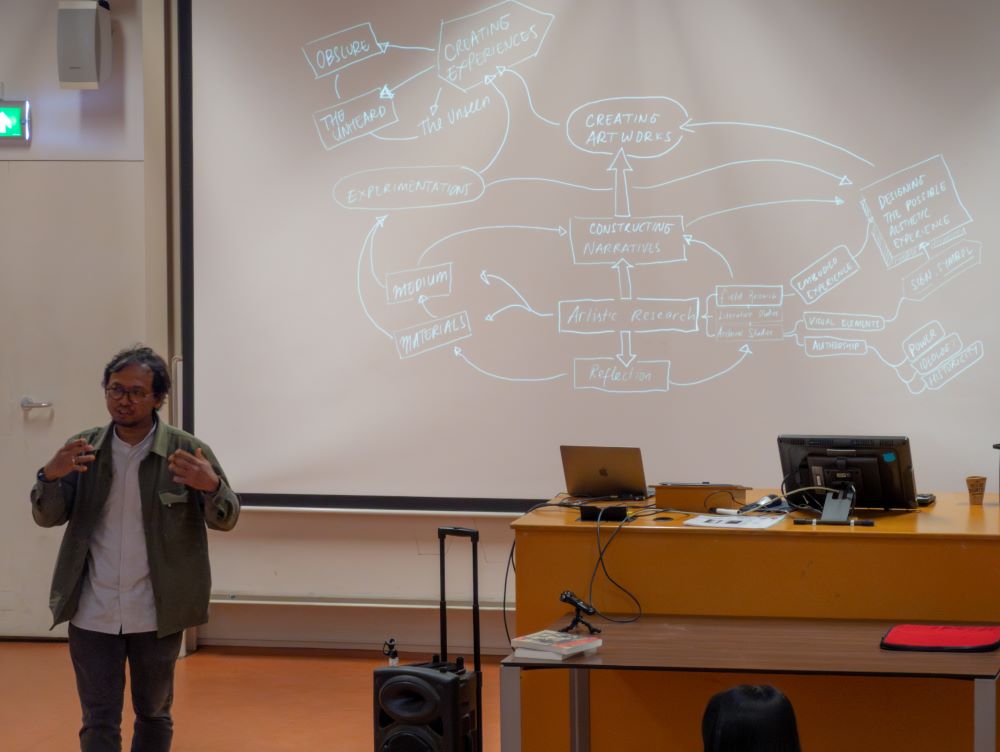| Date | 05/25/2023 |
| Time | |
| Location | WdKA |
| Researchers | |
| Affiliated research project |
|
Reframing the Past, Confronting Colonial Legacies: With Autonomous Practices students and their tutor, Yunjoo Kwak.
Timoteus Anggawan Kusno’s films and installations explore Indonesia’s colonial history. His work combines research and artistic practice. He was part of the exhibition “Revolusi!” at the Rijksmuseum in 2022.
Fiction as a critical research method
According to Timoteus Anggawan Kusno, “the core of my artistic work is to unsettle the colonial methods of power”. This concerns both the colonial logic and the surviving colonial matrix of power. Today, both are hidden layers that he tries to make visible.
Fiction is an important element of his artmaking because it allows for editing. History is written with the same editorial devices. So, history has a strong element of fiction. This is why he works with fiction and metafiction, in the case of the Rijksmuseum with seemingly historical artifacts from Indonesia’s colonial past that are in fact fabricated by him, such as a seemingly historical postcard showing an (actual, historically verified) animal killing ritual used by local Indonesian kings to cement their rule and that of the Dutch colonialists with whom they collaborated.
Through his use of fiction and fabrication, Timoteus Anggawan Kusno works with an artistic method of research. In another piece, “Tanah Runcuk” (“Lost Territory”), he created an installation in a research center about a (fictional) territory and (the made-up story of) an object returned to Indonesia from the British Library. Visitors had no idea that the piece was a fictional performance, including the rituals of boring opening speeches and ritualistic music, and the fabricated academic writing that accompanied the project.

This was meant to question Western modes of knowledge production, to show how rituals of official discourse create a regime of truth, and to challenge the way we perceive history and deal with coloniality. But it was not meant to be a prank, a hoax, or fake news. Instead, there are always disclaimers, in this case in the form of an academic essay and a curatorial statement.
His archival work method allowed him to trace in the project how, for example, “rust en order” (“calm and order”), the official motto of Dutch colonial rule in Indonesia, continued as an implicit ideology of the post-colonial Suharto dictatorship.
For Timoteus Anggawan Kusno, the difference between artistic and academic research is that the outcome of artistic research is an artwork, as opposed to an academic paper, journal, or thesis. His own work also includes field research through sound, combined with literary studies and archival research. He combines all these elements in his work as an academic researcher and current PhD candidate in Media Studies at the University of Amsterdam.
Literature and fiction taught Timoteus Anggawan Kusno that history is not about macro-narratives, but about lived human experience. This makes it possible to present different stories than those taught in textbooks and schools and opens up many ways of approaching and telling history.
In Indonesia’s past, fiction was also a way to get around censorship under oppressive regimes like Suharto’s. That’s why the use of symbolism, fiction and metafiction is widespread in the country. They are devices to make a detour to talk about things that otherwise could not be talked about.
As museum installations, Timoteus Anggawan Kusno’s works also challenge the idea of the museum as a space that generates historical-canonical knowledge.
Takeaways on autonomy
Autonomy as liberation
The notion of autonomy is of great importance to Timoteus Anggawan Kusno and his work. He is motivated by growing up under a dictatorship and being subjected to the strong protocols of education during the authoritarian regime.
For Timoteus Anggawan Kusno, autonomy is a political concept in the sense of not being subjected to authoritarian rule. It is closely related to democracy. During the dictatorship, democracy and autonomy were illusions. After the fall of the regime, autonomy was “what we were collectively looking for”. Timoteus tried to find the meaning of autonomy and found it in making art: “When I come to make art, it creates a moment of autonomy”.
